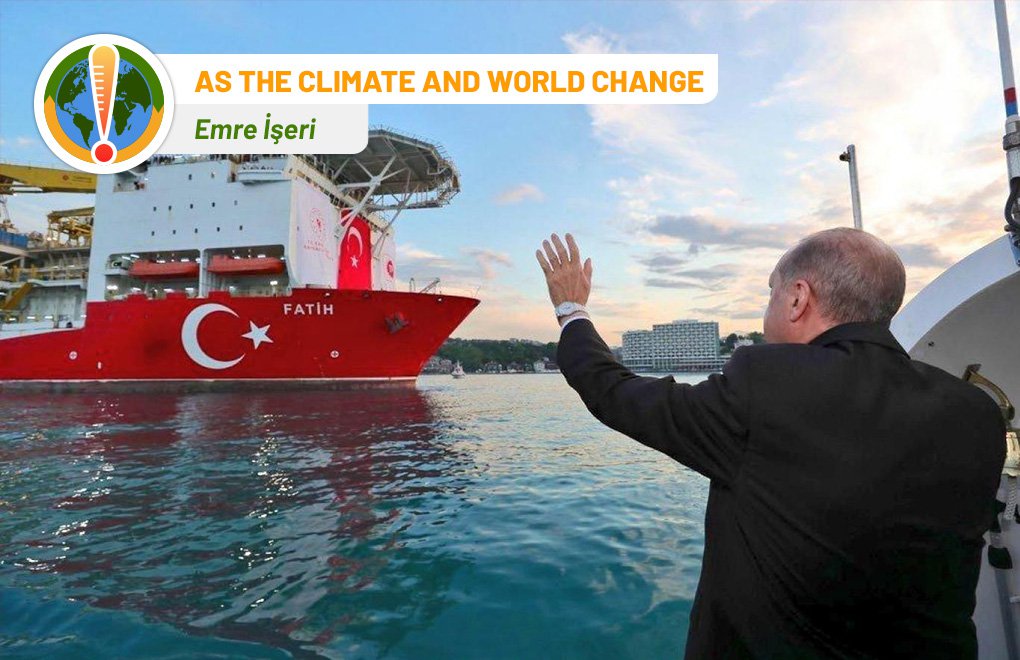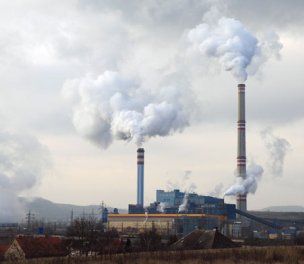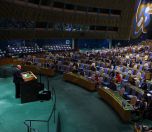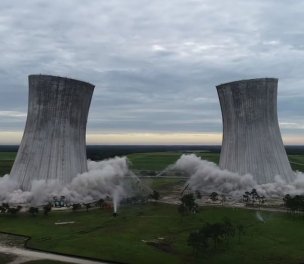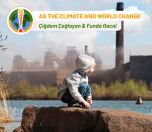Photo: AA/File
Click to read the article in Turkish / Kurdish
While the discussions on the post-Covid-19 course of the fight against climate change continue, the International Energy Agency's (IEA) "Net Zero by 2050 A Roadmap for the Global Energy Sector" report revived hopes for a shift from rhetoric to action.
Considering that fossil fuels are the source of nearly three-quarters of greenhouse gas emissions, the report calls for an end to oil and natural gas exploration activities as well as coal extraction.
IEA's report, known for its support of fossil fuel companies, brought comments as "a knife in the heart of the fossil fuel industry." The report states that extended investments in clean energy can compensate for this radical transition.
Call for a complete transformation
The report highlights the need for a complete transformation in the transportation, industry, and energy sectors. It introduces seven steps (Energy efficiency, electrification, renewable energy, behavior change, hydrogen, bioenergy, and carbon capture/storage technologies) in the energy sector in line with the target of net zero emissions by 2050.
In the relevant transformation process, renewable energy technologies are described as the key to reducing emissions in the electricity supply, revealing the need to increase electricity generation from wind and solar more than eight times by 2050.
Why today?
So why has the IEA announced a roadmap today that requires the complete transformation of the energy systems that underpin our economies?
In the preface of the report, Executive Director Dr. As Fatih Birol stated, if we will have a chance to limit the increase in global temperatures to 1.5 °C in accordance with the Paris Climate Agreement, the year we are in is the beginning of the upcoming critical decade.
Dr. Birol describes the 26th United Nations Climate Change Conference (COP26), which will take place in Glasgow in November, as the focal point of strengthening global goals and climate-related action, which will be built on the foundations of the 2015 Paris Climate Agreement.

The Anthropocene: The last phase of human-induced pillage
By looking at the timing of the report from a broader perspective, we can see that we are facing an environmental crisis unprecedented in human history. The largest mass extinction since the time of the dinosaurs is approaching, as carbon dioxide levels reach levels not seen in three million years.
Such drastic changes mark a new geological epoch in which humanity has reached the pinnacle of disturbing the balance of nature: the Anthropocene (human age).
This era requires a comprehensive transformation in the way we produce and consume energy to counter the pressures of environmental destruction (such as climate change). The biggest, if not the only, cause of environmental degradation is the global dependence on fossil fuels (oil, natural gas, coal), as underlined in the IEA report.
As a matter of fact, the United Nations Development Program (UNDP) determined the title of its Human Development Report in 2020 as "The next frontier: Human development and the Anthropocene."
Human development
The relevant report reveals the need to adopt policies within the framework of human development, as severe and urgent human-driven existential risks are emerging on a planetary scale for the first time in our history.
What is meant by "human development" is not just the wealth of the economy- in which people live, but rather the wealth of human life. Human development, in this respect, focuses on people, their opportunities, and their choices.
Undoubtedly, the increase in human development is directly related to access to energy, which is an indispensable part of modern life, and the socio-economic costs of this access.
What is the place of energy conflicts in human development?
Although humanity is under existential risks such as the climate crisis (caused by the usage of fossil resources), various regions of the world (Arctic, South China Sea, Eastern Mediterranean) are subject to geopolitical conflicts triggered by energy security concerns.
The Arctic, where the "Northern Route" passes, is on the world's agenda after the giant container ship, whose cost to global trade calculated as billions of dollars, stopped sea traffic in Egypt's Suez Canal for six days.
 Photo: The US Department of Defense
Photo: The US Department of Defense
Triggered by the existence of many rich mineral potentials, especially fossil fuels, the region is in a geopolitical rivalry area where great powers such as America, Russia, and China are involved.
The South China Sea, which has a large oil and natural gas reserve valued at $5 trillion under its base, is witnessing geopolitical tension between China, the United States, and other states in the region.
As will be mentioned below, the Eastern Mediterranean is close to conflict over the potential natural gas reserves discovered in problematic areas off the island of Cyprus (an amount that can meet Turkey's needs for 10-15 years with the optimistic estimate) and their export routes.
Why the geopolitical competition?
Why are the parties to the conflicts involved in a geopolitical competition to secure control of fossil resources without a future, rather than prioritizing the fight against the existential threat to our planet, the climate crisis?
The answer to this question depends on which of the definitions of energy security –which has at least 45 different forms – the political decision-makers prefer and which domestic/foreign policy toolkit they refer to.
Decision-makers do not create their energy security policies in a vacuum. They do this in a context where many objective/subjective internal and external factors interact.
Among the factors mentioned, the relatively objective ones consist of the global/international/regional/national political and economic environment, state capacity, the country's economic situation, and resource potential.
Relatively subjective factors are how political decision-makers will protect (power diplomacy, geopolitical alliances, energy diplomacy, sustainable energy) which priority objects (such as state, economic growth, society, people, environment) against which threats (such as war, energy supply, climate crisis).
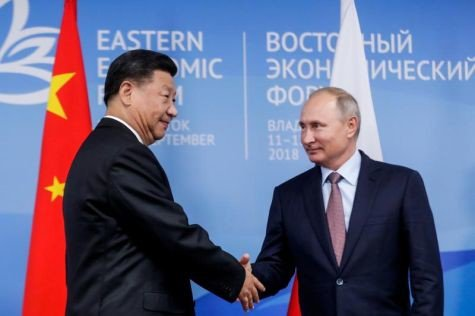 Photo: TASS
Photo: TASS
Three approaches to energy security
Political decision-makers use three basic approaches while defining energy security and determining which internal/external toolkit to use to address this insecurity:
1. Realistic/Geopolitical/Neo- mercantilist
2. Economic Liberal
3. Environmental.
According to the realistic/geopolitical/neo-mercantilist approach, what is understood from energy security is the energy independence of the state.
This state security-oriented approach associates the ownership of geographically fixed and limited resources and the control of their transmission lines to national power and international influence.
From this point of view, regardless of negative social and environmental externalities, it is necessary to increase domestic resource production, establish strategic cooperation and spheres of influence outside the country, and control foreign resource supply, if necessary, through military force.
Economic-liberal approach
The economic liberal approach, on the other hand, focuses on economic growth and assumes that energy security can be established through interdependencies and economic cooperation determined by rules.
In this respect, decision-makers prioritizing state sovereignty over resources in a specific geography, out of market dynamics and cooperation, will increase the supply risks and create price instability and energy insecurity.
Environmental approach
Unlike the other two, the environmental approach focuses on the ecosystem rather than the state's security or economic growth, which has a problematic relationship with human development.
Even though it has reformist and radical interpretations, the environmental perspective identifies that humans are the ones who have put unbearable pressure on our planet, especially after the industrial revolution.
As a matter of fact, the extent of the destruction that humanity has done to nature has led to the entry of a new geological age, the Anthropocene.
Concerning our subject, according to the environmental approach, the first thing to do is to define the ecosystem as the object under existential threat and the threat as fossil fuels while defining energy security.
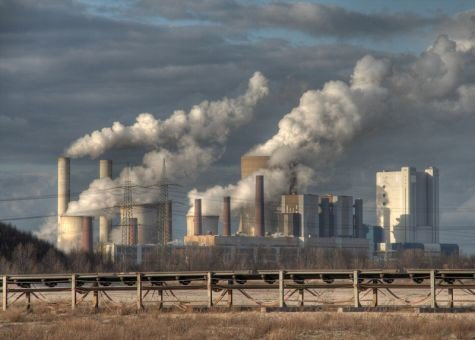
At this point, it should be noted that even though nuclear energy does not emit carbon emissions- one of the conditions for environmental sustainability- it does not provide a sufficient condition. This situation is also valid for hydroelectric power plants with problematic Environmental Impact Assessment (EIA) reports.
According to this view, what needs to be done is to exit carbon-intensive sectors gradually and accelerate the transition to a green economic order. By doing so, conflicts over the ownership of fossil resources would become more and more unnecessary, and energy security could be achieved.
'Growth fetishism' in Turkey
Turkey's definition of energy security and its policies are given in a context in which many internal and external factors interact.
To put it more clearly, the geographical location, state capacity, economic situation, resource potential, the economic model, the party politics(such as the People's Alliance), and geopolitical security perceptions are effective in its energy policy.
Turkey, influenced by W.W. Rostow's modern developmental model, prioritized economic growth with the desire to catch up with the West, especially since the 1950s.
As an extension of the transition to the neoliberal model in the 1980s, it recently caught on to "growth fetishism" and left the social, economic, and environmental costs aside.
Indigenous at home, blue homeland in the world
Today, Turkey supplies 70-75 percent of its primary energy consumption from imported sources. The share of fossil resources in energy consumption is around 80-85 percent.
In accordance with the National Energy and Mining Policy, Turkey has accelerated the development of domestic resources. Increasing its oil/natural gas exploration on this road, Turkey announced that it made discoveries in the Black Sea, Diyarbakır, and Kırklareli.
In addition to these, it invested in liquefied natural gas (LNG) and storage facilities and put a hydrogen strategy on its agenda.
With a contentious decision, the first nuclear power plant to be built in Mersin Akkuyu by the Russian state company Rosatom was approved. The nuclear power plant, planned to be built in Sinop, went by the wayside due to the cost of the Japanese partner.
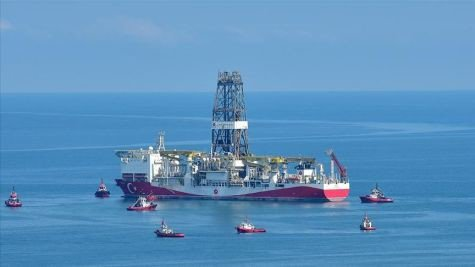 Photo: Ömür Avcı/AA
Photo: Ömür Avcı/AA
The goal of becoming an energy hub
Outside the country, the supply had increased through various pipelines (TANAP, TurkStream) by taking advantage of its geographical location and activating energy diplomacy.
In fact, Turkey aims to increase its geopolitical influence in its region by putting forward an ambitious goal of being an energy hub by associating its energy policy with its foreign policy.
In parallel, Turkey, even though the sharing of sea areas is controversial, evaluated the natural gas discoveries in the southern offshore of Cyprus as an opportunity and claimed that they should be exported to the European natural market via Turkey.
Turkey has engaged in geopolitical competition with the European Union (EU) member Greece and the unrecognized Republic of Cyprus over the resource potential that has not yet reached the production stage and their possible export routes (for ex. EastMed).
Through the use of gunboat diplomacy tools in accordance with the "Blue Homeland" doctrine, Turkey implemented "a policy of escalation of tension" (brinkmanship diplomacy) from time to time.
Turkey claimed that it "spoiled the game" with the maritime zones authorization agreement with Libya in November 2019. Although the geopolitical tensions in the region seem to have settled down after Joe Biden's coming to the Presidency, there is no change in the parties' positions, and the arms race is escalating.
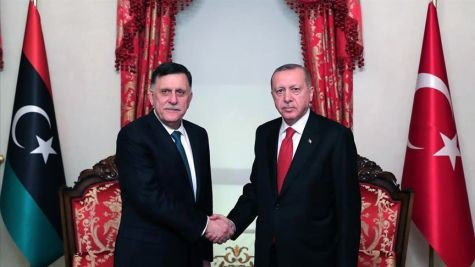 Photo: AA/File
Photo: AA/File
Insistence on not walking on green paths
As mentioned above, we are in an environment where even an institution such as the IEA that has supported fossil fuel companies has set targets for 2050 in line with the Paris Climate Agreement.
However, Turkey, which is the 15th in the world in emission rates, insists on walking on a carbon-intensive path and takes place in the group of countries such as Iran, Eritrea, Iraq, Libya and Yemen by not approving Paris in the parliament.
Although the 12 percent share of wind and solar in recent electricity generation is significant, this development is overshadowed by the 35-40 percent share of coal. In the Eastern Mediterranean, conflict with the EU is preferred because of fossil fuels as the obvious reason.
Missing the opportunity
Apart from the fight against the climate crisis, Turkey seems to miss the green economic transformation accelerated in line with the Green Deal in the EU, which is the leading export market with a 55-60 percent share.
If Turkey insists on not walking the green paths, the most direct impact on its economy will be the additional costs of EU border carbon regulation and loss of competition.
The effect of this insistence on its ecosystem will manifest itself as increasing drought, water shortage, loss of crops in agriculture, air pollution, and plunder of nature.
Why are the parties to the conflicts involved in a geopolitical competition to secure control of fossil resources without a future, rather than prioritizing the fight against the existential threat to our planet, the climate crisis? (Eİ/SO/EÜ/VK)
"As The Climate and World Change" article series*
Our life becomes history while we live! - Ömer Madra
1/ A country outside of the global climate policy: Turkey - Ebru Voyvoda
2/ Climate change, securitarian policies and ghosts - Özdeş Özbay
3/ Turkey's energy policy: Indigenous at home, Blue Homeland in the world - Emre İşeri
4/ The impact of climate crisis and fossil fuels on child health - Çiğdem Çağlayan & Funda Gacal
5/ We will see beautiful days, coal-free and sunny days-Elif Ünal
6 / Either capitalism or the future - Tuna Emren
7 / The three pillars of climate journalism: Science, politics, and social justice - Ece Baykal Fide
8 / Bringing science, struggle, and art together - Yasemin Ülgen
9 / Clean energy or betrayal? - Serkan Ocak
10 / It is time to say stop economic growth - Fikret Adaman & Gökçe Yeniev
11 / When climate refugees knock on our door - Mehmet Mücteba Göktaş
13 / Climate crisis affects women, women affect climate struggle - Merve Özçelik
14 / Climate fiction in literature- Buket Uzuner
15/ Dr. Faustus and children in the age of fire- Ömer Madra
* This series of articles is published with the financial support of Oslo Metropolitan University (OsloMet) Journalism & Media International Center.





